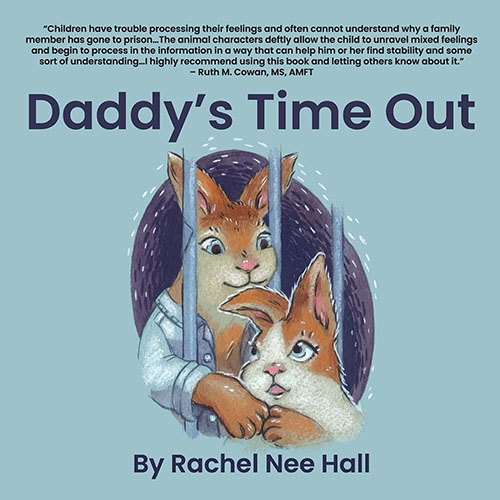
“And even though my daddy was very sorry for what he did, someone very important said that Daddy needed a time out, and now Daddy lives in a place called prison.”
Nibblit the rabbit is missing playing with Daddy, who has had to ‘go away’. Nibblit explains that Daddy did something to break the rules (he took carrots from Farmer Brown’s garden without asking) and was reported to the police, sent to court and eventually to prison.
Nibblit explains that Daddy regretted what he did, but the authorities still decided that he had to have some ‘time out’ to reflect on what he had done (Nibblit’s Mama recounts the time when Nibblit made some poor choices while playing with a friend and was sent to their room for some ‘time out’ to think about what happened).
The story acknowledges that having an incarcerated parent is difficult for the little rabbit, and Mama gently explains that although Daddy has made some bad choices that does not mean that he is a bad person, and he still loves Nibblit very much. The relief that Nibblit feels to hear this is described in a simple way that small children should identify with (“hearing that made me feel all warm in my tummy”.)
Author Rachel Nee Hall clearly understands the issues and difficulties that can arise when a child has an incarcerated loved one, and has set the tone just right in this helpful, reassuring and comforting story. The illustrations, painted in warm tones in a style reminiscent of classic fairy tale books, compliment the story well, show the varying emotions of the characters and provide a useful prompt for discussion.
 Having a loved one in prison can be bewildering and distressing for a young child. They may feel shame, guilt, separation anxiety, and a host of other challenging emotions, or feel that they are no longer loved by (or feel that it is no longer appropriate for them to love) the estranged person. This simple, age-appropriate story helps to reassure, educate and comfort.
Having a loved one in prison can be bewildering and distressing for a young child. They may feel shame, guilt, separation anxiety, and a host of other challenging emotions, or feel that they are no longer loved by (or feel that it is no longer appropriate for them to love) the estranged person. This simple, age-appropriate story helps to reassure, educate and comfort. 

